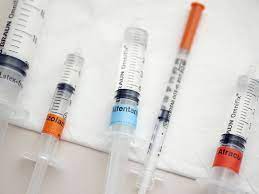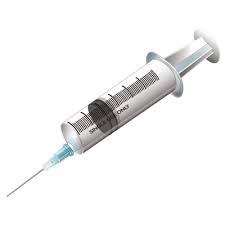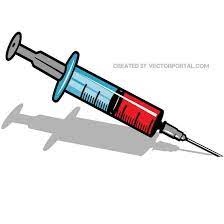Nutropin Bio-identical Human Growth Hormone Injections

Nutropin Hormone Replacement Therapy
If you are over the age of thirty, you may not fully recognize how Human Growth Hormone Deficiency can impact the body. In our early development, all through our teenage years, the primary function of HGH is to help us grow taller and help us develop into healthy adults.
But did you know that Growth Hormone Levels naturally impact health at all stages of the life span?
Suppose you are considering choosing Nutropin for the treatment of HGH Deficiency. In that case, this article aims to help you understand Nutropin HGH Therapy and how it can benefit and improve your life.
Although it is vital to discuss these issues and medical treatments with a qualified physician, it is beneficial to both you and your doctor that you are as fully informed as possible.
Below is a list of Frequently Asked Questions regarding Nutropin Injection Treatments.
Nutropin FAQ
What is Adult Growth Hormone Deficiency?
Adult Growth Hormone Deficiency (abbreviated AGHD) is a medical condition that arises when the Human Pituitary Gland (located near the base of the brain) does not naturally release enough Human Growth Hormone. This medical issue is also sometimes referred to as Somatotropin Deficiency.
What Causes AGHD?In adulthood, there are some reasons why GH Levels can become lower than expected. Some of these reasons are the result of medical illnesses. For example:
Tumors of the Pituitary Gland can alter the standard physiological release of hormones, including Biological HGH.
Surgery in or around the Pituitary can damage the gland, reducing or eliminating its capacity to produce Growth Hormone.
Cancer Radiation Treatments can render Somatotrophs inside the Pituitary Gland nonfunctional.
Head injuries such as severe concussions can also damage the pituitary due to blunt force trauma and swelling.
In addition to these medical causes of Low HGH, the body slowly begins to lose its ability to produce Endogenous Human Growth Hormone as a natural result of aging. Although not pathological, this can still severely limit human health and potential. Many patients choose Nutropin or other HGH replacement forms to alleviate the effects of this natural deficiency.
What Are the Types of HGH Deficiency?
Adults with Low Human Growth Hormone Levels can generally be split into two primary groups:
Most Adults develop Growth Hormone Deficiency during adulthood as a result of Natural Physiological HGH Decline or as a result of medical issues during adulthood. These patients are considered to have Adult-onset HGH Deficiency.
Some patients have experienced Issues with HGH Secretion their entire lives. These patients have what is called Childhood-onset Human Growth
 Hormone Deficiency.
Hormone Deficiency.
The difference between the two forms of deficiency shares some similarities between Type-One and Type-Two Diabetes. Some patients are born with the issue, and others develop it during adulthood for various reasons.
How can Nutropin HGH Treatments Benefit Me as an Adult?
Even though HGH is essential for growth and development, most potently during puberty, the human body needs Human Growth Hormone throughout the lifespan.
Just because our bodies have stopped growing in height doesn't mean that the growth stimulating effects of the hormone are no longer beneficial in adulthood.
Medical researchers and clinical scientists have found that Somatotropin Deficiency can lead to numerous physiological issues, many of which are related to the aging process, including:
Increased Body-fat
Decreased Muscle Mass
Fuzzy Memory
Hindered Mental Cognition
Poor Cholesterol
Low Energy
Weakened Immune System
Increased Injury Rehabilitation Time
Sleeping Disorder
I'm Taking Other Medications for Hormone Optimization. Why Should I also Consider Nutropin Injections?
Dependent upon the root cause of Adult-Onset Growth Hormone Deficiency, patients may take other Hormone Replacement Therapies in addition to HGH.
Although the Pituitary Gland is most widely recognized for releasing Endogenous HGH, the Pituitary is also responsible for the release of many different hormones as well. Sometimes issues with the Hypothalamus also contribute to symptoms related to Growth Hormone Deficiency.
All hormones released by the pituitary are delivered through the body via the circulatory system. After the Pituitary Gland releases hormones into the blood, each hormone circulates to different target organs or tissues to accomplish important goals. Human Growth Hormone is released by the pituitary and is responsible for several different vital functions, including:
Childhood Growth
Muscle Development
Weight Control
Healthy Sleep
Mental and Cognitive Optimization
Energy Maintenance and Fatigue Reduction
Improved Cholesterol Profile
Although Human Growth Hormone produces several benefits and performs many vital functions, other hormones released by the pituitary also impact physical health in ways that alter the release and benefits of HGH.
It is essential to discuss any and all medications that you are taking with a medical specialist to ensure that Nutropin Growth Hormone Injections are right for you. Sometimes, your medications may not permit you to use this therapy. In other cases, the medications you are taking may simply lead your  Hormone Specialist to alter your dosage to optimize your HGH Benefits.
Hormone Specialist to alter your dosage to optimize your HGH Benefits.
It is also essential to inform your Prescribing Growth Hormone Physician about any supplements you take or vitamin regimens you engage in. Human Growth Hormone HRT is usually combined with Dietary and Nutritional Guidelines to increase the effectiveness of treatment.
Your current health choices can help your doctor tailor your HGH Plan to help you get the most out of therapy.
What are the Forms of Adult-Onset GH Deficiency?
There are two forms of Adult-Onset HGH Deficiency, and there are different ways to diagnose each form of deficiency:
One form of Growth Hormone Deficiency is the result of a direct malfunction of the Pituitary Gland. This is the rarer cause of Low HGH Levels. This deficiency is usually caused by health conditions that have hindered the body's ability to produce natural levels of Human Growth Hormone. Nutropin Hormone Replacement Therapy naturally restores Normal Hormone Levels by directly replacing HGH that the pituitary cannot secrete correctly on its own.
The second type of Growth Hormone Deficiency results from the hypothalamus's reduced function. Low HGH levels are rarely caused directly by medical complications arising from the Hypothalamus.
Still, Age-Related HGH Decline is a direct result of changes in Hypothalamic function that occur in adults over the age of thirty.
As we enter our thirties, the Hypothalamus begins releasing less and less Growth Hormone-Releasing Hormone (also known as GH-RH). This intermediary hormone is the direct precursor of Human Growth Hormone.
For reasons not fully understood by Endocrine Scientists, declined release of GH-RH is a direct cause of Adult GH Deficiency.
How is Adult Human Growth Hormone Deficiency Diagnosed?
Growth Hormone Deficiency directly caused by Pituitary malfunction can be diagnosed using a method known as GH Stimulation. With this test, your physician will use GH-RH or another chemical such as Arginine to stimulate the pituitary gland to release HGH directly.
HGH Deficiency involving a healthy pituitary gland can be diagnosed by testing the bloodstream for a hormone called Insulin-like Growth Factor One (IGF-1).
Although Human Growth Hormone quickly dissipates from the bloodstream, making natural production hard to track, IGF-1 stays in the bloodstream for a more extended period of time, making it a more helpful barometer for your innate HGH Production.
How Can I Be Diagnosed with Low Growth Hormone?
To be diagnosed with Chronically Low HGH Levels, you must both have a demonstrably reduced ability to secrete Human Growth Hormone and be symptomatic.
If you experienced Youth-Onset Growth Hormone Deficiency as a child, you must show your physician documentation to prove your ongoing deficiency.
What Pituitary Issues can Lead to Adult HGH Deficiency?
In adults, Low Levels of Growth Hormone can directly result from damage to the pituitary or diseases that hinder the gland's function. In addition, pituitary tumors can lead to Growth Hormone Deficiency, the most common of which is a pituitary adenoma. Direct damage to the brain due to surgery, trauma, and internal bleeding can also reduce the function of the pituitary. Radiation can also limit the effectiveness of the pituitary gland.
Why did my Medical Specialist Request a DEXA Scan Before Prescribing Nutropin Shots?
DEXA Scans can monitor body composition. One of the most significant symptoms of HGH Deficiency is a reduction in bone density. The Dual-Energy X-Ray Absorptiometry Scan can be used to quickly and vividly show the health of a patient's bones.
DEXA Scans can also provide other information, such as your personal Body-Fat Ratio, highlighting the percentage of Lean Muscle to Body Fat in your body. By monitoring fat, muscle, and bone density, DEXA Scans allow your physician to monitor the benefits of your treatment by comparing before and after pictures which will track the effectiveness of your individualized Nutropin Hormone Therapy.
How Important Is It to Rotate Sites of Nutropin Injection?
It is imperative to Inject Nutropin in a different location every time you administer the hormone treatment. The subcutaneous injection can sometimes lead to irritation and skin atrophy if you repeatedly inject treatment into the exact location. By rotating the location at which you administer Nutropin, you significantly reduce the risk of issues related to inflammation and tissue breakdown.
Does Nutropin Lead to Fluid Retention?
Nutropin and other forms of HGH Therapy can sometimes lead to edema. Although edema is possible, the medical issue can quickly be resolved by adjusting the Nutropin Dosage or taking a medication or supplement which reduces fluid retention. In most cases,0 water retention subsides naturally.
What Other Side-Effects Can Occur as a Result of Nutropin Injections?
The most common side-effect of Nutropin HRT is irritation at the injection site. This can manifest itself as redness, soreness, or general discomfort. These issues are not dangerous, but it is still important to inform your physician.
Most other side-effects related to Nutropin Injection in adult patients result from Nutropin Overdose or Nutropin Abuse. If you experience any of the following symptoms, inform your doctor immediately:
Knee pain, hip discomfort, or the development of a slight limp
Swelling
Water Retention
Carpal Tunnel Syndrome
General allergic reaction
Stomach pain: pancreatic inflammation very rarely occurs as a result of Nutropin Treatment
Nausea, migraine, vision changes: Nutropin can rarely increase fluid pressure in the brain. This symptom is generally not dangerous if caught relatively early.
Before using Nutropin for the first time, talk to your doctor about the appropriate Nutropin Injection Protocol to ensure that you utilize the drug safely and effectively.
Who is Nutropin HGH For?
Nutropin Hormone Replacement Therapy is a form of HGH Hormone Treatment that is only attainable via prescription and is delivered via a device known as the NuSpin Pen.
Nutropin can be used by young patients with Childhood-Onset HGH Deficiency and patients past the age of puberty that suffer from Adult-Onset Growth Hormone Deficiency.
Children that suffer from the following medical issues can use Nutropin Hormone Treatments:
Children that are unable to produce adequate HGH
Young patients suffering from Idiopathic Short Stature. These individuals suffer from a medical condition that prevents them from growing in height at the
 same rate as their peers.
same rate as their peers.Adolescents with Turner Syndrome qualify for Nutropin Injection Therapy. Turner Syndrome is a genetic disorder that hinders the body's ability to produce Human Growth Hormone adequately.
Young boys and girls that suffer from Chronic Kidney Disease: Kidney malfunction typically prevents the body from producing HGH. Nutropin can encourage average growth and development as the patient waits for a kidney transplant.
Adults can qualify for Bio-Identical Nutropin if they meet any of the following criteria:
For continuing treatment of Childhood HGH Deficiency.
For management of Adult-Onset Growth Hormone Deficiency as a result of any medical condition which renders the pituitary unable to function correctly.
For treatment of Age-Related HGH Deficiency to restore health and Normal Human Growth Hormone Levels.
The Safety of Nutropin Treatment
Before choosing Nutropin, examine the following information closely. If you have any questions or concerns, be sure to discuss them with your Hormone Replacement Physician.
Nutropin Injections Should Not be used by:
Individuals that currently are experiencing significant medical issues resulting from abdominal surgery, open heart surgery, multiple-organ trauma, or severe breathing difficulty. Nutropin has been linked with an increased risk of death in these instances.
Young patients suffering from Prader-Willi Syndrome that are significantly obese and have experienced issues with breathing in the past: Prader-Willi Patients that have issues with breathing problems such as sleep apnea, airway blockages, or obesity have increased mortality risk as a result of Nutropin and other forms of HGH Replacement.
Patients of any age currently suffering from active cancer: HGH Deficiency can rarely be the sign of a brain or pituitary gland tumor. Before using Nutropin, your physician should test to ensure that your deficiency does not result from cancer.
Individuals with certain diseases of the eye are influenced by diabetes.
Young patients that have finished the growth spurt associated with puberty.
Persons with an allergy to Bio-Identical Somatropin, which is the functional component of Nutropin HRT. These allergies are not generally dangerous and most commonly manifest as high irritation points where the HGH Treatment was injected.
What should your physician know before you begin Injecting Nutropin?
Your doctor must know what medications you are currently taking and what medical conditions you suffer from. Specific medical treatments must be adjusted when taking Nutropin HRT, including:
Other forms of Hormone Treatment
Diabetic medicines, including, but not limited to, Insulin
Steroids such as Testosterone HRT
Cyclosporine
Certain Seizure medications
Nutropin and Tumors
Tell your doctor if you have any benign tumors on the brain or if your HGH may result from tissue abnormalities in the brain. HGH Hormone Treatments may agitate these issues and must be monitored closely by your physician.
Nutropin and Cancer
If you have had a history of cancer, especially cancers of the brain, prostate, or ovaries, inform your doctor. There is a minor risk that certain cancers can manifest themselves again due to Nutropin Injection Treatments.
Nutropin and Diabetes
If you are currently diagnosed with diabetes or have a high clinical risk of developing diabetes, you should only engage in Nutropin HRT with regular blood sugar monitoring. Human Growth Hormone does affect blood glucose levels, and you may need to adjust your Nutropin or Insulin dosage as a result.
Nutropin and Hypopituitarism
Suppose you suffer from general Hypopituitarism and are already taking hormones for overall Pituitary Deficiency. In that case, your physician should closely monitor your Nutropin Treatments and your other Hormone Treatments to ensure your medical protocol's safety and effectiveness.
Nutropin, Pregnancy, and Nursing
Nutropin Injections should only be used by female patients in cases where an absolute need is established. If you are planning a pregnancy or are currently nursing, you should discuss your treatment options with your doctor. It is currently unclear if the mother releases Human Growth hormone in breast milk.
Nutropin and Thyroid Health
Thyroid Health should be monitored intermittently throughout Nutrogen Treatments. Some patients may also require Thyroid Hormone Replacement in addition to HGH HRT.
Geriatric Nutropin
Although Human Growth Hormone Replacement Therapy has been studied clinically in patients over the age of sixty-five, Nutropin HRT has not been officially cleared. Geriatric patients may respond more actively to Nutropin, so there may be a slightly increased risk of side effects.
Nutropin and Turner Syndrome
Turner Syndrome Patients should be evaluated for heart conditions or ear infections when using Nutropin Hormone Replacement Therapy.
Nutropin and Corticosteroids
Nutropin Bio-Identical Somatotropin Treatments may interact with the human body's ability to properly utilize cortisone and cortisol, leading to a medical issue known as hypoadrenalism. In patients where this medical issue arises, Glucocorticoid Treatments may be needed to restore optimal hormone function.
Nutropin Handling and Storage
It is vital to store Nutropin under refrigeration at a temperature ranging from 36-46 Degrees Fahrenheit. Never freeze Nutropin. After reconstituting your Nutropin Cartridge for the first time, it must be disposed of within four weeks.
Always check the expiration date before using Nutropin. Discard expired medications. If your Recombinant Nutropin Solution is not clear, you should never inject the treatment.
Contact the Conscious Evolution Institute for More Information!
To learn more about Nutropin HRT or other forms of Hormone Replacement Therapy or HGH Treatment Brands, call the Conscious Evolution Today!
- 0001 Tev-tropin Human Growth Hormone Injection Information [Last Updated On: January 22nd, 2025] [Originally Added On: November 15th, 2020]
- 0002 Bio-identical Somatropin Injection Therapy [Last Updated On: January 22nd, 2025] [Originally Added On: November 16th, 2020]
- 0003 Saizen Hgh Hormone Replacement Therapy Treatment [Last Updated On: January 21st, 2025] [Originally Added On: November 17th, 2020]
- 0004 Norditropin (Injectable HGH): The Basic Facts for Patients with HGH Deficiency [Last Updated On: August 29th, 2025] [Originally Added On: November 19th, 2020]
- 0005 Information About 5 Mg Humatrope Vials [Last Updated On: December 23rd, 2025] [Originally Added On: November 20th, 2020]
- 0006 Information About 5.8 Mg Omnitrope Hgh Vials [Last Updated On: December 22nd, 2025] [Originally Added On: November 21st, 2020]
- 0007 Humatropen Human Growth Hormone Injection Device Information [Last Updated On: May 23rd, 2025] [Originally Added On: November 22nd, 2020]
- 0008 Humatrope Bio-identical Hgh Injections [Last Updated On: December 21st, 2025] [Originally Added On: November 23rd, 2020]
- 0009 How To Use HGH [Last Updated On: February 23rd, 2025] [Originally Added On: November 24th, 2020]
- 0010 Cool.click 2 Serostim Injection Device Information [Last Updated On: December 20th, 2025] [Originally Added On: November 25th, 2020]
- 0011 Non-Injectable Options for HGH Therapy [Last Updated On: April 28th, 2025] [Originally Added On: May 10th, 2023]
- 0012 Introduction to Using Human Growth Hormone (HGH) [Last Updated On: February 14th, 2025] [Originally Added On: February 14th, 2025]
Word Count: 2698






